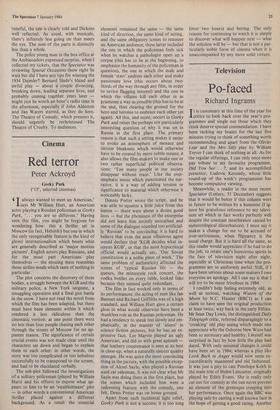Cinema
Red terror
Peter Ackroyd
Gorky Park (`15', selected cinemas)
6 T always wanted to meet an American,' 1 says Mr William Hurt, an American actor playing a Russian policeman in Gorky Park, ... you are so different.' Having seen this film, you might be forgiven for wondering how: this a thriller set in Moscow (in fact, Helsinki) but one in which the only recognisable feature is the kind of glossy internationalism which besets what are generally described as `major motion pictures'. English actors play Russians, and for the most part Americans play themselves — the ensuing mess resembles those airline meals which taste of nothing in particular.
The plot concerns the discovery of three bodies, a struggle between the KGB and the military police, a New York sergeant, a smuggling operation and a final gun battle in the snow. I have not read the novel from which the film has been adapted, but there must have been elements within it which rendered it less ridiculous than the cinematic version: at one point there were no less than four people chasing each other through the streets of Moscow for no ap- parent reason. The significance of certain crucial events was not made clear until the characters sat down and began to explain them to each other: in other words, the story was too complicated or too nebulous successfully to be transposed to the screen, and had to be elucidated verbally.
The sub-plot followed the investigations of a solitary policeman (played by William Hurt) and his efforts to expose what ap- pears to him to be an `establishment' plot — in other words a conventional American thriller placed against a different background. As a result the essential
elements remained the same — the same kind of direction, the same kind of acting, and the same obligatory scenes to reassure an American audience; these latter included the one in which the policeman feels sick when he watches a pathologist open up a corpse (this has to be at the beginning, to emphasise the humanity of the policeman in question), the one in which the male and female `stars' undress each other and make passionate love (this occurs about two- thirds of the way through any film, in order to revive flagging interest) and the one in which the villains kill each other in as gruesome a way as possible (this has to be at the end, thus clearing the ground for the hero and heroine to embrace each other yet again). All this, and more, occurs in Gorky Park and raises the perhaps not particularly interesting question of why it was set in Russia in the first place. The primary reason is that such a setting makes it easier to evoke an atmosphere of menace and sinister bleakness which would otherwise have to be created by more subtle means; it also allows the film-makers to make one or two rather superficial political observa- tions: `Too many people in our society disappear without trace.' Like the over- emphatic music which punctuated the nar- rative, it is a way of adding tension or significance to material which otherwise it noticeably lacks.
Dennis Potter wrote the script, and he was able to squeeze a little juice from this lemon — there were about a dozen good lines — but the phoniness of the enterprise did not leave him entirely unscathed and some of the dialogue sounded too artificial- ly `Russian' to be convincing: it is hard to believe that even the most villainous agent would declare that `KGB decides what in- terests KGB', or that the most hypocritical official would actually say, `Our Soviet constitution is a noble piece of work.' The same problem of authenticity affected the scenes of `typical Russian life — the queues, the minuscule rock concert, the vodka bottles on every table, looked fake because they seemed quite redundant.
The film in fact worked only in terms of its performances: the acting of men like Ian Bannen and Richard Griffiths was of a high standard, and William Hurt gave a certain gloss to what would otherwise have been a thankless role as the Russian policeman. He had a tendency to speak too slowly and em- phatically, in the manner of `aliens' in science fiction pictures, but he has an ex- pressive face. Lee Marvin played an ugly American, and did so with great aplomb that leathery countenance is seen at its best in close-up, when a naturally sinister quality emerges. He was quite the most convincing thing in the picture, with the possible excep- tion of Alexei Sayle, who played a Russian used car salesman. It was not clear what Mr Sayle was doing there in the first place, but the scenes which included him were a redeeming feature: with the comedy, one felt, Denis Potter was on home ground.
Apart from such incidental light relief, Gorky Park is not a success; it is too long (over two hours) and boring. The only reason for continuing to watch it is simply to discover what will happen next — what the solution will be — but that is not a par- ticularly noble form of cinema when it is unaccompanied by any more solid virtues.


































 Previous page
Previous page